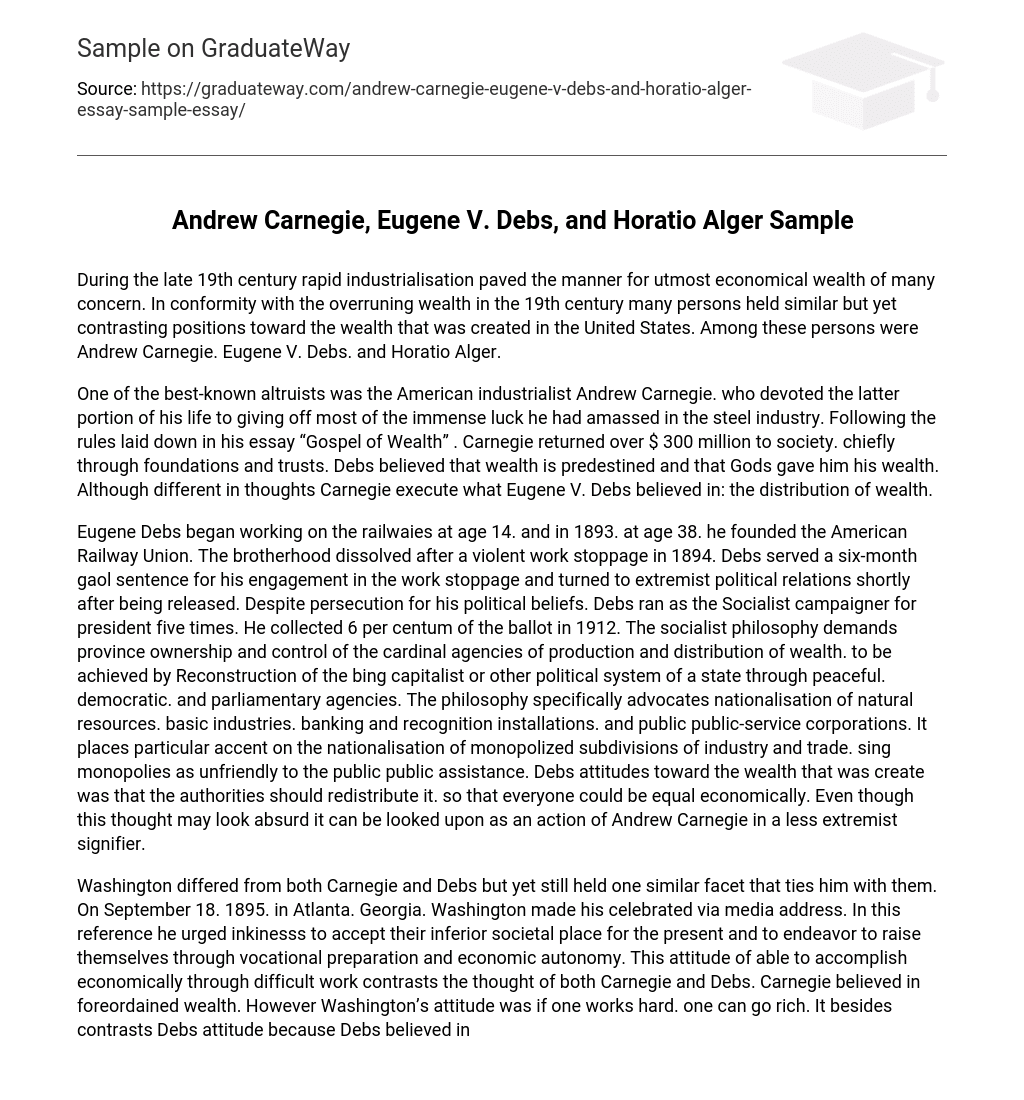During the late 19th century rapid industrialisation paved the manner for utmost economical wealth of many concern. In conformity with the overruning wealth in the 19th century many persons held similar but yet contrasting positions toward the wealth that was created in the United States. Among these persons were Andrew Carnegie. Eugene V. Debs. and Horatio Alger.
One of the best-known altruists was the American industrialist Andrew Carnegie. who devoted the latter portion of his life to giving off most of the immense luck he had amassed in the steel industry. Following the rules laid down in his essay “Gospel of Wealth” . Carnegie returned over $ 300 million to society. chiefly through foundations and trusts. Debs believed that wealth is predestined and that Gods gave him his wealth. Although different in thoughts Carnegie execute what Eugene V. Debs believed in: the distribution of wealth.
Eugene Debs began working on the railwaies at age 14. and in 1893. at age 38. he founded the American Railway Union. The brotherhood dissolved after a violent work stoppage in 1894. Debs served a six-month gaol sentence for his engagement in the work stoppage and turned to extremist political relations shortly after being released. Despite persecution for his political beliefs. Debs ran as the Socialist campaigner for president five times. He collected 6 per centum of the ballot in 1912. The socialist philosophy demands province ownership and control of the cardinal agencies of production and distribution of wealth. to be achieved by Reconstruction of the bing capitalist or other political system of a state through peaceful. democratic. and parliamentary agencies. The philosophy specifically advocates nationalisation of natural resources. basic industries. banking and recognition installations. and public public-service corporations. It places particular accent on the nationalisation of monopolized subdivisions of industry and trade. sing monopolies as unfriendly to the public public assistance. Debs attitudes toward the wealth that was create was that the authorities should redistribute it. so that everyone could be equal economically. Even though this thought may look absurd it can be looked upon as an action of Andrew Carnegie in a less extremist signifier.
Washington differed from both Carnegie and Debs but yet still held one similar facet that ties him with them. On September 18. 1895. in Atlanta. Georgia. Washington made his celebrated via media address. In this reference he urged inkinesss to accept their inferior societal place for the present and to endeavor to raise themselves through vocational preparation and economic autonomy. This attitude of able to accomplish economically through difficult work contrasts the thought of both Carnegie and Debs. Carnegie believed in foreordained wealth. However Washington’s attitude was if one works hard. one can go rich. It besides contrasts Debs attitude because Debs believed in the redistribution of wealth. However despite theses differences there is one thing that ties them together: the redistribution of wealth. Washington founded several organisations. including the National Negro Business League. to farther black promotion. Because he donated to organisations or society he was redistributing his wealth.
Andrew Carnegie. known for his great parts to sociality ; Debs for his extremist socialism beliefs ; Washington for beliefs in working towards wealth all played a cardinal function in determining 19th century history. Their thoughts were really contrasting. but nevertheless they each overlapped each other in a alone manner which led to the belief or action of redistribution of wealth.





